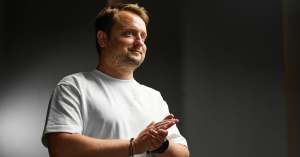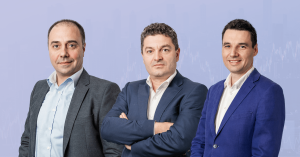The European Investment Fund (EIF) has launched a new call for the RRF Equity Fund of Funds, designed to empower innovative companies with crucial access to equity financing through carefully selected venture capital and private equity partners in Bulgaria.
The new Fund of Funds has been set up in cooperation with the Republic of Bulgaria, Ministry of Innovation and Growth and the EIF, and is financed by the Bulgarian Recovery and Resilience Plan.
The fund aims to facilitate financial access through equity or quasi-equity investments across three categories:
- Innovation Window: This window, starting with an initial budget of up to €67.5 million, focuses on enhancing companies’ innovation capabilities and expediting their progress towards a knowledge-based economy.
- Growth Window: With an initial budget of up to €67.5 million, this window supports the continued development and expansion of businesses.
- Infrastructure Window: Allocating up to €27 million initially, this window targets investments that primarily contribute to climate neutrality. Its focus lies in accelerating the green and digital transition within priority sectors.
In an interview with The Recursive, EIF’s mandate manager Vivi Papassouli sheds light on the distinct features of this new fund, and dives into its specific focus within its three main Windows. The deadline for applications by fund managers is open until August 31, 2025.
The Recursive: How is the new fund different from the previous program?
Vivi Papassouli: Тhe new initiative is financed by the Recovery and Resilience Facility, whereas the respective initiatives of the previous programming period were financed by the European Structural Funds. The different sources of financing inevitably bring a number of different requirements and restrictions – some more flexible and some less flexible than before. In principle, though, it is the EIF’s role to step in and try to align the specificities of these financing resources with usual market practice.
Moreover, the new RRF Equity initiative has three distinct investment Windows: an Innovation, a Growth, and an Infrastructure on. It is the first time we specifically target infrastructure as a separate investment priority. There is a specific budget allocated to these windows as foreseen in the Recovery and Resilience plan of the country; budget flexibility in between the windows may be discussed at a later stage, subject to RRP revisions, if any.
Clearly, we are still targeting equity and quasi equity risk financing for Bulgarian innovative companies also through this Call. But I think what we also need to highlight as a key difference is that this Call, this new RRF initiative, is now targeting a very different market than what the previous initiatives were targeting. The Bulgarian ecosystem has matured significantly since the time the previous calls were launched. The market is much more educated; the success stories have helped train founders, they have helped train entrepreneurs but also investors; even the fund managers have more experience and are better networked at the global scale. This call is being launched in a completely different environment than its predecessors.
The fund management teams, which are applying for the support are expected to demonstrate their track record and well balanced skill sets in the team. To what extent would already established venture capital and private equity funds have an advantage over the emerging ones?
First time teams are always welcome to the EIF. This comes hand in hand with our regional business and it’s enshrined in the way we help nurture ecosystems in areas of Europe that do not have as developed ecosystems as say, Germany or France. Had the EIF not supported first-time teams in countries like Bulgaria, Romania and Greece, the growth and evolution of these amazing startup cosystems would not have happened.
In terms of teams the EIF is looking for elements like cohesion, commitment, governance, track record, reputation; elements that teams need to prove they have or can bring on the table. Indicatively, track record can be built by an established team, but separate people building a new team can also bring together interesting and complementary investment track records. All in all, I don’t believe established teams have an advantage; both emerging and existing teams will all have to go through the same rigorous due diligence procedure that the EIF has become known for in the region and throughout Europe.
Right now we also have much more awareness about the importance of female fund managers.It is a well known fact that the VC industry in our region is heavily male-dominated. However, gender diversity often leads to more investments in women-led and more gender-balanced startup teams. Will gender diversity be a factor in the selection process of the year?
I would challenge that this is only a regional issue – this is actually a pan-European problem. Women are widely underrepresented in managerial positions all across Europe; women only have 34% representation at EU level and as investors they are only receiving a fraction of the capital flow even despite the fact that there is a positive correlation between female representation in business and investment and better performance. The EIF does actively promote gender diversity in its investments, but only provided that the due diligence process has resulted in a positive outcome for the team under consideration. Just to be clear, there are mandates that dedicate a specific part of their resources to gender equality – this is not one of them. That said, our teams are always on the lookout for gender diversification in the selected fund managers’ teams.
There are three windows targeted by the new fund. With the Infrastructure fund, the EIF also aims to contribute to climate neutrality and accelerate the green and digital transition to priority sectors in the country. Do potential venture capital funds and private equity partners need to have an ESG strategy when they apply?
Fund managers have to prove they align with ESG principles but this does not only apply for the Infrastructure window. The EIF is committed to be a value-driven and responsible market operator. It is also committed to promote ESG standards both within the organization and in relation to its counterparts. It has its own ESG principles that include key parameters of its own ESG framework that it applies to its own operations, but also to its other contractual counterparts, including our VC and private equity partners.
All of the selected funds that we cooperate with are requested to fill in an ESG questionnaire through which we assess their capabilities to address ESG risks and opportunities; the maturity of the responsible investment approach; and the integration of key ESG plans in their culture and processes. Again, this is not a requirement only for Infrastructure fund managers, but applicants under the Innovation and Growth Windows as well.
Bulgaria is currently waiting for the new call of the National fund of funds. How is the fund that is operated by the EIF through the Recovery and Reconstruction equity fund complementary to the national one and how do they play together?
We don’t have the details of the calls that will be launched by the FMFIB but we are in communication with both the Ministry of Innovation and Growth and the relevant Managing Authority. I understand that complementarity is actively sought for at all those levels. Our understanding is that we will have different footings in terms of timing of when we will reach the market. The calls of the FMFIB are financed by different financing resources, namely Structural Funds, bringing different requirements as well as different investment priorities. We do believe that the fact that all these Calls are centrally coordinated will ensure complementarities.
Fund managers understand that that is going to be focused on Bulgaria, but you mentioned that you would be more flexible and have more regional mandates?
The way the call is structured, it allows and foresees that the funds that will be supported by the new Recovery Equity Call will be obliged to invest the equivalent of the RRF committed amount in companies that are established and have main operations in Bulgaria or that plan to expand their operations in Bulgaria.
That said, the equivalent of resources leveraged from other private or institutional investors can be invested in companies in the wider region; e.g. in a EUR 100 million fund where the RRF equity initiative commits EUR 20 million, it is these 20 million that will need to be invested in companies that meet our geographical criteria to be established and operating in Bulgaria; the rest can have a broader regional focus. We are hence targeting both regional and national funds.
Due to the current economic downturn, many fund managers are sharing that they’re experiencing a lot of challenges when it comes to fundraising from private investors – such as mainly high net worth individuals but also the pension funds. How are you going to support them?
Indeed, it is a dire fundraising environment not only for the region, but at the European and the global level. We can also not be sure how it will evolve in the future as it is a very volatile environment and the call has a deadline until August 2025; it remains to be seen how this will evolve for the fund managers that will be fundraising in the years 2024/2025 and moving forward.
The EIF has always been supportive to fund managers in the past year when fundraising problems emerged. We have been flexible in extending closings or discussing smaller ticket sizes, always within limits that make sense from an investment perspective, to help fund managers start their investment periods.
Can you elaborate on how the funds are going to be structured – what is the portion of the funds that needs to be raised by private investors, and how are you going to complete the count afterwards?
As mentioned, we have three distinct Investment windows. The Growth window and the Infrastructure window are expected to have at least 30% private participation because these target more mature and bigger projects. This 30% private participation will also ensure that the funds are out of the state aid regulatory frameworks and they will operate as standard market operators.
The Innovation window is targeting more innovative pre-seed companies, and it can potentially support funds such as technology transfer funds, or funds targeting social entrepreneurship or impact investing. It opens up investment opportunities in new sectors for fund managers that would be interested to explore them.
The fund managers can thus potentially go either for 30% of private investors’ money and hence opt for the market economy options that does not include state aid; or they can opt for what we call the GBER state aid framework, and close the fund with as low as 10% of private money. Under this option, the GBER state aid framework, state aid restrictions apply, hence the fund managers will have to be more diligent in following up on their portfolio and relevant state aid requirements; we are here to help navigate all of this. This option actually takes care of the riskier parts of the portfolio that can be built under the RRF Call where a fund can reach final closing with less private participation, and can also allow for a capped return on public resources, providing for the beneficial treatment of private investors. This will hopefully give a boost to private investors and offer them an additional motive to come into these riskier portfolios.This is an option of the Innovation window that is interesting to look into.
Can one team apply for two windows or is the application restricted to one of the windows?
Any applicant can submit their proposal under two windows as well. It is up to the team to explain to the EIF how their investment strategy will fit both windows and how the team is equipped to attract pipeline e.g. for both the Innovation and the Growth windows or the Growth and the Infrastructure windows.
Data shows that more than half of the most successful companies in the world have risen in a bear market. In the long term from an economic cycle point of view, this is a good time to invest and if you make good bets you can also acquire interesting results. In this sense, do you believe that this logic can be applied also for this recession that we’re experiencing right now?
Indeed, funds in times of economic crisis seem to somehow outperform their peers. This is based on historical data, so there is no reason to believe that this time will be any different or this region will be any different. That said, the equity business is a risky one irrespectively of the overall macroeconomic environment, so it’s extremely hard to make projections. The EIF has been successfully operating in the European VC and private equity markets for almost 30 years now.
What I believe is important to underline is the impact that these initiatives have had and will continue to have on ecosystems in the region. The financial impact is one thing and I completely understand that investors are in it for the returns, because the EIF is also profit (as well as policy) driven. But it is also significant to note that these regional initiatives leave a mark, an impact that is not so easy to track in numbers.
We need to keep track of where the ecosystem of Bulgaria was when we all started working on it, how it evolved, how success actually yields success on the market: how entrepreneurs become founders, they become angel investors, they mentor other entrepreneurs.There is a virtuous cycle that can only bring positive results for the economy, for the whole market, and ultimately for the people in the region. The positive results persuade people that left the country to come back and give back, and further help nurture the economy.
We always have to keep our focus on the overall impact, even though it is not always easily measurable in concrete numbers. But if you go back in the past 10 years and see how the Bulgarian startup ecosystem has evolved, this is the real positive mark that initiatives such as the ones we are launching with the RRF equity initiative leave in the country.








